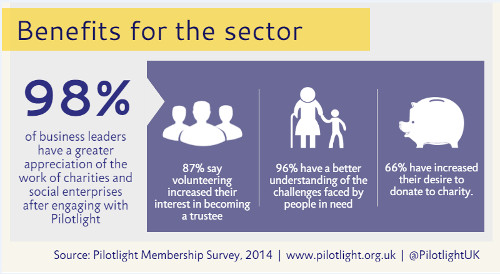Volunteering makes business leaders more likely to donate to charity and become trustees, according to a report looking at what motivates the business community to volunteer.
A survey by Pilotlight, a charity that connects the business and charitable worlds, on the volunteering habits of its active business volunteers showed that 87 per cent of the 134 respondents were more interested in becoming charity trustees after volunteering, while two-thirds said that volunteering had increased their desire to donate.
Of the respondents, 98 per cent said that volunteering their time and skills to charity had increased their appreciation of the work of charities and social enterprises. Some 84 per cent of senior executives said they got involved with charities “to give something back”, while nearly two-thirds said it had increased their own job satisfaction.

Gillian Murray, chief executive at Pilotlight, said: “85 per cent of business leaders in our survey said they had improved their coaching skills after working with charities and have a much better understanding of the charity sector as well.
“The survey results demonstrate that a carefully managed approach to skills-sharing allows the time-poor, skills-rich professional to engage with charities in an effective and meaningful way.”
These results come on the eve of #GivingTuesday, the global campaign to encourage people to get involved with charities.
The survey also revealed that 85 per cent of respondents felt they had improved their coaching skills through working with charities, while 87 per cent said it had increased their awareness of leadership styles. A further 89 per cent said engaging with charities had improved their own sense of well-being and happiness.
Dr Beth Breeze (pictured), director of the Philanthropy Centre at the University of Kent, said: “There is a wealth of research pointing to the personal benefits of altruism - from physiological benefits to the cardiovascular and nervous system, to social benefits such as larger friendship groups, to ‘ultimate benefits' such as a greater sense of life satisfaction. Most volunteers intuitively know this to be true - while observers only see them giving, the volunteer is aware how much they are also receiving."
Pilotlight surveyed all its 257 active business volunteers in October, with 52 per cent responding to the online survey. Of these, 92 were members of Pilotlight in London, and 42 were members in Scotland. Sixty-six volunteered directly through Pilotlight, and 68 volunteered through their company. Of the respondents, a third were female and two-thirds male.
A similar study was conducted six months ago by the same organisation.









